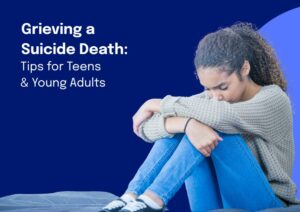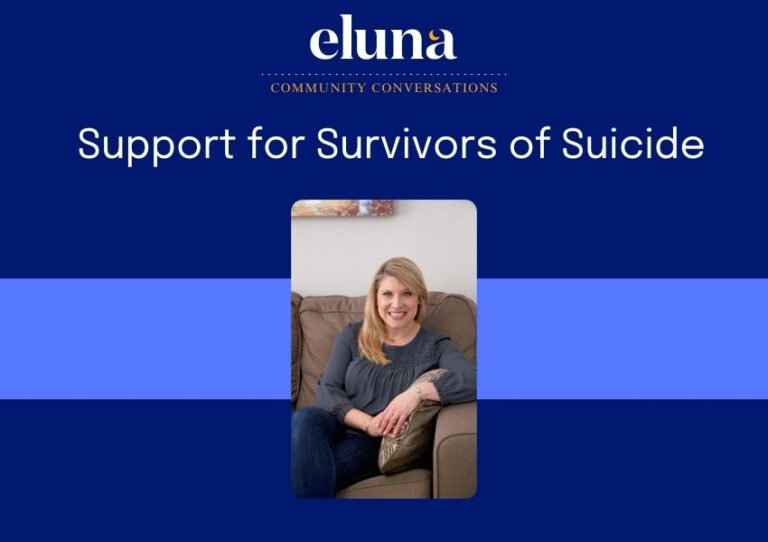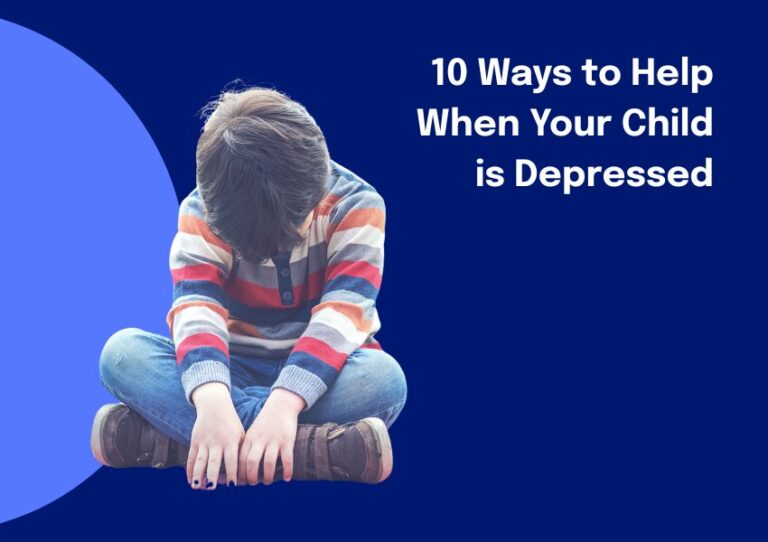Grieving a Suicide Death: Tips for Teens & Young Adults
 As a teen or young adult, you are in a time of transformation – carving a path towards independence while establishing a personal foundation of values and beliefs. This is no small task, especially in a pressurized social environment, like high school, college, or work. For most of these life changes you’ve had time to mentally & collectively prepare with your peers. However, when you suddenly lose someone to suicide, your world is turned upside down propelling you into a life-altering change – one that you never wanted and could never be prepared for.
As a teen or young adult, you are in a time of transformation – carving a path towards independence while establishing a personal foundation of values and beliefs. This is no small task, especially in a pressurized social environment, like high school, college, or work. For most of these life changes you’ve had time to mentally & collectively prepare with your peers. However, when you suddenly lose someone to suicide, your world is turned upside down propelling you into a life-altering change – one that you never wanted and could never be prepared for.
Grieving a death by suicide is an unusually heavy burden, it carries additional layers of complex feelings and unexpected reactions from friends, family, and society at large. Often referred to as disenfranchised grief, you may face assumptions, judgements, and inappropriate comments from your friends and community. Then comes the secondary loss of isolation and distance from your peers that often accompanies suicide grief – or that strange look on people’s faces as they struggle to find words. It may be nearly impossible to see beyond your grief, especially when a central aspect of grief is feeling a lack of control.
It is important to be extra kind and patient with yourself during this time – it’s okay not to be okay. There is no right way to grieve. Allowing yourself to express a full range of emotions & responses is the best way to honor yourself, your person, and who they are to you. Similarly, there is no time frame for grief. It is more accurate to say that people learn how to live with grief and its many forms that shift over time. What’s important to remember, especially when you are grieving a death to suicide, is that their death is not your fault. Experiencing feelings of guilt does not mean that you are guilty. What to do:
Read
- This handout is designed for teens to help understand death by suicide and process complex feelings, questions, and beliefs.
- Suicide Grief for Children & Teens: How to Answer Tough Questions includes possible questions & answers to consider as you build your toolkit of responses.
- Grieving the death of a person in your life is part of your personal story – one that you can decide when and where to share. This Safe Storytelling resource includes storytelling tips and sample scripts based upon age, relationship, & setting.
- Suicide Loss: What Teens Need to Know is a booklet is for young people bereaved by suicide. It reflects the self-help philosophy of Survivors of Suicide (SOS), a group of individuals who have lost someone close to suicide. It covers concerns discussed at SOS support groups and it tries to put these issues into context for young people.
- Consider reading The Astonishing Color of After by Emily X.R. Pan a stunning and heartbreaking novel about finding oneself through family history, art, grief, and love after losing a mother to suicide.
- Another novel to check out is Speak of Me As I Am by Sonia Belasco. A moving story of grief, honesty, and the healing power of art. Melanie and Damon are both living in the shadow of loss. For Melanie, it’s the loss of her larger-than-life artist mother, taken by cancer well before her time. For Damon, it’s the loss of his best friend, Carlos, who took his own life. As they struggle to fill the empty spaces their loved ones left behind, fate conspires to bring them together.
Write & Draw
- Grief is hard work of the heart and journaling can be a steppingstone to move inward and forward. Take a look at these grief journal pointers and prompts for some ideas on how to begin.
- Consider Eluna’s Goodbye Letter template with sentence starter prompts.
- Art with Heart, A Seattle-based non-profit, creates and distributes therapeutic books that combine art and writing to help cope with overwhelming feelings. We recommend INK ABOUT IT for teens & young adults.
- The Deconstruction Reconstruction Grief Journal by the Dougy Center is a place to draw, write, paint, and transform your thoughts & feelings – designed specifically for teens & young adults.
- Teenage Grief Sucks (TGS) is a teen-run website that’s starting conversations about teenage grief. Run by Natalie Adams, who lost her dad when she started high school, TGS shares weekly stories about grief from the perspective of teens. TGS also invites you to share your grief in written or multimedia format.
Watch
- Talking about suicide is hard and learning how to survive suicide loss is even harder. Wendy’s TEDx talk will demonstrate the crossroads of love and loss and the importance of acknowledging what you feel. Wendy deeply believes that in order to move forward, we must first end the stigma that is holding us back.
- How do you tell younger children in your family that someone they love died by suicide? This video aims to further support the idea of around the importance of truth telling when a when a loved one dies from suicide or a violent death.
- Created in support of Eluna’s Community Conversation: Supporting for Survivors Suicide, this video page provides resources and tools to address the specific needs of suicide grief.
Listen
- Grief Uncensored Podcast, hosted by Julia Gallegos and Yako Shirasuna, was created to uncover the reality behind a heartbreaking tragedy: losing a parent way too soon. They are two twenty-somethings that found each other in the wake of grieving their parents throughout the last semester of college.
Connect
- Suicide Loss Grief Support Groups Teen & Adult are monthly peer-based grief support groups for teens and adults who have experienced the pain of losing someone to suicide death. Teens and adults discuss in separate groups. Whether you have lost a family member, friend, or coworker, and regardless of how much time has passed since their death by suicide, you are welcome to attend this group. Once registered, support group participants will receive a private, secure link to the online session.
- Suicide Bereavement for Teens (SB4T) meets on the second Tuesday of every month from 8pm-9pm EST via zoom. This is a FREE online group for anyone in the United States between the ages of 14-19 who has lost someone to suicide. Please contact Jessica Lincoln (571) 206-1778 [email protected] to learn more or register.
- Coping After Suicide Teens is for teen survivors of suicide loss. In this group, teens can connect with peers who really get it. Coping After Suicide Teen Groups meet on Zoom, so teens can participate wherever they are. And they’re small and private, to ensure a safe space for meaningful sharing. There is a fee for attending.
- Samaritans’ SafePlace meetings are open groups of caring people who have lost a loved one to suicide. SafePlace peer support groups for suicide loss survivors are facilitated by trained volunteers who have also lost a loved one to suicide. Meetings are free, ongoing, and drop-in. Please register here and they will send you a Zoom meeting invitation with details.
- Survivors of Suicide (SOS) Support Group provides support to people who have been affected by a suicide loss. Each adult group is facilitated by a suicide survivor/volunteer and a mental health professional. Please call 608-280-2435 if you are interested in attending.
- Camp Kita is a tuition-free summer bereavement camp for children and teens ages 8 – 17 who are survivors of a loved one’s suicide, located in Maine. Email [email protected] to learn more.
- The Dinner Party is a community of 21-45 year olds who have each experienced the loss of a parent, partner, child, sibling, other close family member, or close friend. They offer two different programs (Buddy System and Dinner Tables).
Visit
- The Sibling Survivors of Suicide Loss website aims to provide a safe place for anyone who has lost a sister or brother to suicide. It’s a place to share memories, discuss your feelings and experiences, and to share photos. It’s a place to connect with others who also miss their sister or brother.
- The Alliance of Hope for Suicide Loss Survivors was created by survivors for survivors. They provide host an online forum that operates like a 24/7 support group and their website contains support resources and information on the survivor experience.
Follow
- With active posts and followers on Instagram, the American Foundation for Suicide Prevention strives to save lives and bring hope to those affected by suicide.
- Alliance of Hope’s Instagram & Facebook pages provide hope & healing support to those grieving after a suicide. They also host a 24/7 online forum for thousands of suicide loss survivors.

